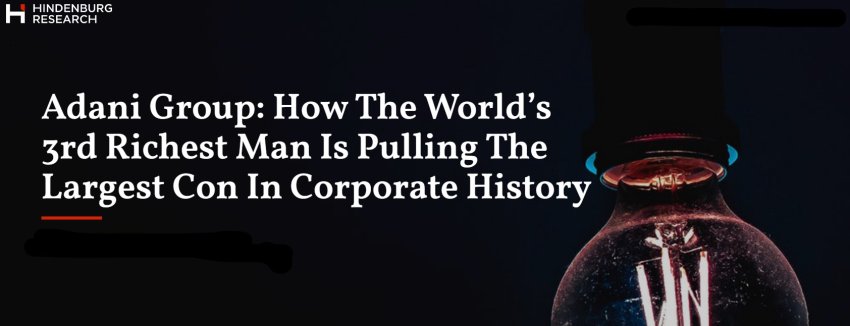
Gautam Adani’s (GA) US$218 billion vast imperium specialises in transport, infrastructure and mining, with far reaching feelers that have made their mark in a number of countries.
Adani’s companies have made a name for themselves: employment laws have been breached and human rights abuses have featured. Governments and regulators have been lied to. No environment is ecologically safe from the company’s activities, despite their assertions to the contrary. The CEO has also cultivated politicians across the globe.
But despite their efforts, Adani and key members of the GA group, of which eight hails from the family, have not been immune from criticism. A number of reports from non-government organisations and activists document a bad record.
But the evaluation from US investment firm Hindenburg Research, whose findings were published last month, approached the conduct of the conglomerate Adani Group a bit differently.
Hindenburg Research’s central allegation is that Adani has “engaged in a brazen stock manipulation and accounting fraud scheme over the course of decades”.
Having spoken to dozens of individuals, including former senior executives, conducting a review of thousands of documents and visiting a number of sites across half a dozen countries, the picture that emerges is even uglier than first thought.
The image of financial security and reliable solvency comes across as a fiction. In addition to grossly inflated valuations, the Adani companies have taken on substantial debt. Shares of inflated stock have been pledged to secure loans.
A sense of the false accounting picture given by Adani’s accounts can be gathered from the practices of Gautam Adani’s younger brother, Rajesh, who was accused by the Directorate of Revenue Intelligence (DRI) for being a key figure in a diamond import/export trading scheme in 2004–05.
Rajesh had used a number of offshore shell companies to generate artificial turnover. Gautam’s brother-in-law, Samir Vota, was in on the scheme, allegedly making a number of false statements to the regulators.
The saga of alleged corrupt behaviour includes the activities of Vinod Adani, Gautam’s older brother. This person allegedly plays a key role in managing dozens of shell entities that serve the functions of stock manipulation and money laundering. The latter part is achieved through using money from Adani’s private companies to bloat the balance sheets of the listed companies.
Adani’s response to the claims — 413 mostly irrelevant pages — was to accuse the US firm of being in “flagrant breach of applicable securities and foreign exchange laws”, conduct becoming the “Madoffs of Manhattan”.
A nationalist narrative was also injected into the rebuttal: to attack the Adani Group was nothing less than attacking Indian success itself.
Hindenburg Research’s counter to such bluster was chastening. India, “a vibrant democracy and an emerging superpower with an exciting future”, was being “held back by the Adani Group, which has draped itself in the Indian flag while systematically looting the nation”, it said.
Since Hindenburg Research released its findings on January 24, Gautam Adani’s inflated personal wealth has been pared back. From being the third richest man, he is now missing from the top 20.
Within days, the conglomerate’s market value was wiped to the striking sum of US$113.6 billion. The company has promised to prepay loans with $1.1 billion and call off its secondary share sale. The collateral used by the companies to secure funds has also suffered a fall in value.
Despite the number of allegations directed at Gautam, the family and his associates, another country and its government have fallen under the group’s spell.
Israeli Prime Minister Benjamin Netanyahu and Adani shook hands on January 31 to confirm the US$1.18 billion sale of the port of Haifa that had been agreed earlier in the month.
Netanyahu hopes to leverage investments made in the Haifa project to create a trade route linking the Mediterranean and the Gulf, bypassing the Suez Canal. In the words of the Israeli Prime Minister, Haifa would “become the entry point and exit point for a vast number of goods that will reach the Mediterranean and Europe directly, without having to go around the Arabian Peninsula”.
To do this, the Abraham Accords are being touted as the economic centrepiece, enabling rail links to be established in Saudi Arabia, through Jordan and ultimately to Haifa port itself. But Netanyahu, himself no creature to accusations of corruption, is facing a figure and business partner in freefall.
[Binoy Kampmark currently lectures at RMIT University.]